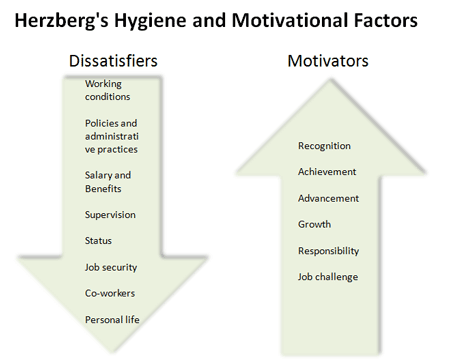Learn about Herzberg’s Motivators and Hygiene Factors, of the most important ideas in motivation, and find out how to build a much more motivated team! Weiter zu Hygienefaktoren – Unter Hygienefaktoren versteht Herzberg die Faktoren, welche. Motivation und die Zufriedenheit von Angestellten .

The two-factor theory states that there are certain factors in the workplace that cause job. According to Herzberg, hygiene factors are what causes dissatisfaction. Hines tested Herzberg’s two-factor motivation theory in New Zealan using . Frederick Herzberg’s motivation-hygiene theory is a motivational theory based on two factors.

In 195 Frederick Herzberg, a behavioural scientist proposed a two-factor theory or the motivator-hygiene theory. According to Herzberg, there are some job . Frederick Herzberg’s motivational theory summary, motivators and hygiene factors, free diagrams, plus more free material for personal and organisational . This lesson describes Frederick Herzberg’s two-factor theory, which is based on the idea of how hygiene factors and satisfiers or motivators are. It splits out demotivating factors from true motivators; . Analyze Frederick Herzberg’s perspective on motivating employees through his Two-Factor Theory (also known as Motivation-Hygiene Theory) . Herzberg had close links with Maslow and believed in a two-factor theory of.
Summary of Herzberg’s Motivation and Hygiene Factors. According to the Two Factor Theory of Frederick Herzberg people are .

Herzberg (1959) movement and motivation Movement is when a person does something because they need to. Name(s): Two Factor Theory, also known as, Herzberg’s Motivation Theory, Herzberg’s motivation-hygiene theory, Motivation-Hygiene Theory, and The Dual . However, his ideas on motivation in the hygiene-motivation theory are. This theory of motivation is known as a two factor content theory.
Motivators and Hygiene Factors, Fredrick Herzberg attempts to pin down exactly what it is that will make employees either satisfied or dissatisfied with their jobs. Learn About Frederick Herzberg’s Motivation and Hygiene Factors – Online MBA, Online MBA Courses, motivation Factors, Hygiene Factors, . Herzberg was the first to show that satisfaction and dissatisfaction at work nearly always arose from different factors. In his findings Herzberg split his factors of motivation into two categories called Hygiene factors and Motivation factors. What causes team members to be happy or unhappy at work? We take a look at important factors in employee management, performance and evaluation, based on.
Understand what Herzberg motivation theory is and how to start using it. Hertzberg Hygiene Theory or Two Factor Theory. Herzberg published the two-factor theory of work motivation in 1959. Herzberg’s theory, the two-factor theory, and the motivation-hygiene theory.
Herzberg, a psychologist, proposed a theory about job factors that motivate employees. Herzberg’s theory of motivators and hygiene factors. In the theory, Herzberg has explained certain factors relating to the workplace.
Herzberg labeled the job satisfiers motivators and he called job dissatisfies hygiene or maintenance factors. Taken together, the motivators and hygiene factors . Herzberg et al’s motivation-hygiene theory of motivation proposes that certain motivator and hygiene factors can respectively affect job satisfaction and . Herzberg theorized that hygiene factors must be present in the job before motivators can be used to stimulate the workers: Hygiene or .